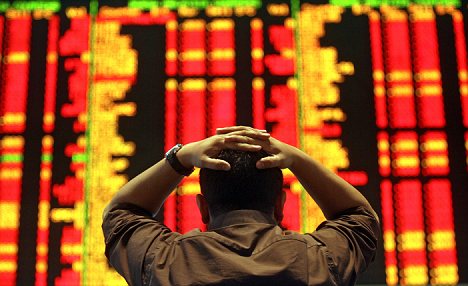At first glance, online trading seems simple enough. The stock either goes up or down, and to come out successful, you need to guess correctly slightly more times than you end up being wrong. It should be doable, right?

The fact of the matter is, online stock and CFD trading is one of those things that are easy to get into but hard to master. Those without the experience necessary often make fatal mistakes that end up costing them a lot of money. Depending on how much was at stake when entering the market, this could be tens of thousands of dollars or more.
The good news is that you don’t have to learn from your mistakes. Instead, it would be wise to listen to those who have been doing this for years and learn the lessons they’ve had to learn the hard way. To help you on your online stock trading journey, we’ve summarized them into an easily digestible list of key takeaways you can weave into your trading strategy today.
- Risking too much, too soon
It’s easy to start daydreaming about a single big winning trade that would essentially double your bankroll and allow you to retire to the Bahamas. However, if the trade turns against you, you could find yourself with an empty wallet in the blink of an eye.
Regular traders will tell you to never risk more than a small percentage of your total capital on a single trade. That way, you’ll keep your bases covered even if it turns for the worst. Moreover, there won’t be as much of a psychological burden on you to let it ride on a single decision.
As you may know, one alternative to the above is spread betting. Due to built-in leverage, betting on spreads doesn’t require a large starting capital – you can even start with as little as $5. Do note that, depending on which way the price movements go, there’s the possibility of accumulating a net loss that’s bigger than the initial investment.
Be advised there are certain risks associated with spread betting, too. Apart from the built-it leverage being a double-edged sword like we already mentioned, there’s also the risk of having your positions automatically closed by the platform outside of the business hours. Then, there’s also the risk of gapping/slippage, which can make the stop loss order be executed at a different level than what you’d normally expect.
The vast majority of retail client accounts lose money when spread betting and/or trading CFDs. You should consider whether you understand how spread bets and CFDs work and whether you can afford to take the high risk of losing your money.
- Revenge trading
When the financial markets just don’t want to go your way and you find yourself on the losing end in a streak of bad luck, you may be tempted to succumb to your emotions and start making irrational moves just to cover your losses. Don’t. You’ll likely sink into the red even further.
As you probably know already, online trading can sometimes test your patience, especially on a bad day. Try to think of it as an exercise in self-restraint. When you feel your blood boiling, take a break and come back when you’ve reached a neutral emotional state.
The reality of online trading is that you will win some and lose some. Since a bad day can happen to the very best too, don’t take it to heart. Instead, choose to view it as part of the game – a couple of lost battles doesn’t necessarily mean you’ve lost the war.
- Not knowing when to exit your position
When you don’t close the trade when netting a nice profit, the volatile nature of the financial markets means the price movements can easily make a u-turn on you. Don’t succumb to greed. It’s much better to be modest and pull out of the trade when things are going favorably, as hard as it may be.
The biggest mistakes you’ll ever make in online trading is basing your decisions on fear and greed which are some of the strongest emotional states you’re bound to encounter. So what’s the better way?
The answer is laying out a plan in advance and sticking to it no matter what. In its most basic form, this means snapping out of it and closing the trade once you’ve reached your profit target. With experience, walking the fine line between risk and reward will become much easier.
- Copying the masses
Fact: the vast majority of traders lose money, so don’t copy the losers – model your decisions after the winners instead. Typically, those will be the kind of people who have been doing this for years and can back up their decisions with solid reasoning and technical analysis.
But then again, don’t mindlessly follow in their footsteps either! In the long run, it pays to understand why they’ve chosen to make a particular move rather than trying to copy it as is. The objective is to understand their way of thinking and using it as a basis in your own decision-making process.
In the end, it comes down to who you’re taking your advice from and trusting your better judgment. As a general rule of thumb, you should never enter a trade without doing your own research, no matter what anyone else is saying. Period.
- Assuming the history always repeats itself
While past performance is one of the strongest metrics to consider when deciding whether a market is worth getting involved in, don’t make the assumption that things will always be the way they used to be. Mighty empires have fallen before, and the same logic can be applied to the financial markets.
This assumption is particularly deadly when combined with FOMO (fear of missing out) type of thinking. At its core, it’s just another form of emotional trading. In reality, you never know when a particular market has already reached its peak and the price movements are only bound to go south from there.
- Not tracking your trades
Tracking your trades in a journal seems like a whole lot of extra work, but the fact of the matter is that it can help you recognize both the successes as well as the leaks in your overall trading strategy.
If you don’t have the willingness to log all the details, at the very least, you should note the entry and exit position of every trade you make, regardless of the outcome. But to get to the bottom of things, it does pay to write additional details such as the date and time, the thoughts you had going into the trade, and possibly take a screenshot for good measure.
When you feel like reviewing the decisions you’ve made in the past and thereby refining your trading strategy, it will all be there for you to study.
- Overly relying on leverage
People often use leverage with spread bets and CFDs. The reason being is that it allows you to get into the game with limited capital and multiply the profits in a single trade really fast. However, this is a double-edged sword. Yes, it will amplify your winning trades, but the same applies to losing ones. In other words, leverage is synonymous with extra risk.
While some leverage is fine, you should never over-commit to a trade by going overboard with it. Using too much leverage has the capacity to eat up your entire capital before you say ‘cheese’. So instead of trying to see where the limits are, adopt a different frame of mind by always going with the minimum amount of leverage possible.
When you become more experienced, you can increase the leverage as you go. But certainly not as a beginner.
- Biting off more than you can chew
From derivative trading and all the way to CFD trading and spreads, there are so many ways to trade that it’s easy to get lost in a flood of information. It is as they say – a jack of all trades is a master of none, and the same will happen to you if you try to specialize in everything.
Instead, you should laser-focus on a single thing, analyze it, and eventually know everything there is to know about it. The same concept applies to taking too many positions at the same time – don’t. Your focus is a limited resource you should invest wisely.
Following a proven system and keeping a journal of your trades is the preferable route to take when you’ve reached the stage of wanting to take your online trading to another level.
- Failing to use a safety net
Trading without a stop-loss order is like driving a car without car insurance. It may seem alright until something happens, but as soon as it does, you will be in a world of hurt.
In the world of stock trading, a stop-loss mechanism works as a safety net that can potentially prevent a major financial disaster. In case the price movements get out of hand and your stock starts to rapidly lose value, the mechanism will go off to protect your capital. It’s the equivalent of an airbag going off when crashing your car to soften the blow.
- Not doing your due diligence
If you think you can guess your way to riches, think again. If you’re not willing to do your due diligence before entering a trade, this is the wrong hobby to get involved in.
Instead, treat your online trading adventure as an ongoing learning experience. Aside from learning from your own moves, don’t forget to study other educational materials such as ebooks, courses, and articles. Be strategic in your learning – whenever there’s something specific you’d like to broaden your horizons on, that’s the direction you want to be pursuing.
Conclusion
It’s unrealistic to expect you’ll make all the right calls every single time. But by steering clear of the mistakes listed above, your chances at success should improve drastically.


 Hot Features
Hot Features











